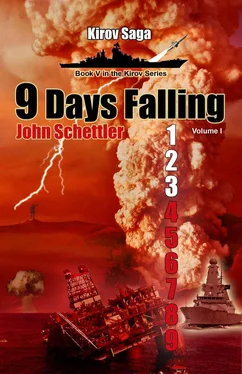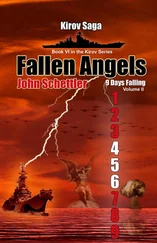“What a load,” said Mudman. “That guy must have been trained by Baghdad Bob. No war, eh? What’s all the smoke and fire for then?”
Flack was at the Plexi screen, binoculars up and watching the menacing lighters closer to the shore. There had been bad news all morning, explosions inshore north of Busachi and south of Fort Shevchenko, pipelines destroyed, pump stations on fire, not to mention the loss of the Crowley tug Galveston and all its crew taken as hostages. He had called the local military and police to no avail, and the Merc order he had urgently placed had gone unfilled. There were just too many facilities at risk to adequately guard them all. The security forces in the region, and the fourteen hapless patrol boats of the Kazakh Navy, were already stretched thin, now locked in a death grip with MECCA rebels.
“We’re too damn close to those bastards,” Flack murmured. “Hell, they attacked the Shell platform a while back, and that was 24 miles off shore!”
“Where are those Mercs?” asked Mudman. “Better get a helo in here, boss.”
The phone rang and Flack moved to his desk, irritated, his eyes still watching the coast for signs of hostile movement in his direction. He knew his time was running out. He’d be lucky if he could get a company helo now and get his people to safety.
It was Richmond again, only this time the manager at the other end of the line promised good news. “We’ve got some help heading your way right now. Fairchild has three tankers on the way to Supsa, and we want you get anything you have into the trans Caspian pipeline to Baku.”
“What do you think I’ve been doing?” Flack bawled. “The problem is this: we’re losing pump stations on shore and the flow pressure is down—Kapish?”
“Then rig to load your local tankers and move it that way. We need that oil bunkered in Baku ASAP.”
Flack was shocked. “Yes, I have three or four tankers at Fort Shevchenko, but I can’t even begin to contemplate an operation like that without security. You guys must be out of your minds!”
“Now calm down, Flack. We’ve got the security. Fairchild’s flagship is leading in tankers to Supsa.”
“A lot of good that will do me here,” Flack protested. “Supsa is on the Black Sea coast. This is the goddamned Caspian , or have you looked at a map lately?”
“Yes I can read a map. What I’m saying is that this Fairchild ship is a destroyer, or something like one, not one of their tankers—a ship called the Argos Fire. Rumor has it the damn thing is armed to the teeth. They have helos with the range to get out your way, and they have security personnel too.”
The mention of helos brightened Flack’s mood considerably. He took down the call sign and frequency to contact the Fairchild group, writing quickly with a dulled pencil.
“Now you just worry about those tankers. These helos are the new X-3 hybrids—something like an Ospry. I’ve heard they’re packing some mini guns and shit. Nobody is going to bother you, mark my words.”
Flack hung up, his mind racing. How was he supposed to get a loading operation started in this mess? He pulled up the flow diagrams on his computer. He had three pump stations down, but there was still #17, and a good line out to the platform. Even with pressure as low as it was, he could probably get something moving and loaded if he could keep #17 up. It was inshore in the shallows, however, a dangerous place to be.
“Mudman!” he yelled to get his tech’s attention. “Get on the blower and call Pump 17. Tell them we need them to get ready to push crude my way. Anything they can move.”
“What the hell we gonna do with it?”
“Never mind, just call them and tell them what I said.”
At that moment the sound of distant gunfire jangled his already frayed nerves. Flack ran to the Plexi screen, raising his binoculars. He saw three lighters heading directly toward his platform, bristling with brawny, dangerous looking men in camo fatigues. They were joy shooting in the air to announce their imminent arrival. He felt the cramp in his bowels tighten.
“We’re gonna have company, Mudman. Looks like the MECCA oil war is about to get personal.”
The shift tech was already peering at the scene with obvious anxiety. “I think you better tell the Rig Boss to put his sidearm away,” he breathed. “These guys look like hell warmed over.”
“Ain’t gonna be no PTA meeting,” said Flack. He considered the alternatives, edging over to his desk, his eyes riveted on the advancing boats.
But something was odd about their approach. They diverted left, circling briefly. Then Flack knew why. In the distance he heard the telltale thump, thump, thump of a helo, and turned to see two copters low on the horizon behind him.
“KAZPOL?” Mudman was at his side as Flack peered through his binoculars.
“Not from that direction… Can’t be Caverton either. Nothing I’ve seen round here before,” he breathed. “Maybe it’s this Fairchild Group.” In the nick of time will do, he thought.
“Fairchild?” Mudman was in the dark. “Who’re they?”
“Never mind who they are—you just get on the phone to #17 like I said.”
“Right, Flackie.”
The lighters continued to circle, like three sharks prowling around a great mechanical behemoth. Through his high powered lenses Flack had a good look at them, tough looking thugs, their faces swathed in black face masks or dark bandanas. Many wore white turban head dresses and checkered scarves. Each one sported ammunition belts draped over their shoulders, and they were heavily armed. They seemed equally perplexed by the approaching helos, some pointing at the aircraft and shouting. The shout was an order, Flack realized, when one of the men hefted a light machinegun and opened fire. The oil war, which the Caspian government denied, was now just a few hundred yards away.
Overhead, the two Fairchild helos saw the tracer rounds streaking up, wide off the mark, but close enough to get their attention. They were flying a modified version of the revolutionary Eurocopter X-3. With two turboshaft engines powering a five-blade main rotor system and two propellers on short-span fixed wings, it was capable of over 220 knots and could range out about 900 nautical miles at lower speeds. They made a high speed run into Baku, refueled at the BP facilities there, and then raced north, flying low over the Caspian Sea to reduce their radar signature in case there were unfriendly eyes out there. They made their approach on the eastern shore, well away from Russian assets in the region. This version was specially adapted by Fairchild engineers for security purposes. The twin 30mm rocket pods were augmented by a pilot controlled mini-gun mounted in the nose of the sleek craft.
The group leader, Lieutenant Ryan, barked an order when he saw the tracer rounds sprayed in his direction, his voice heavy with the touch of silver as he spoke, a true thoroughbred Irishman. “I suppose we’d best intro duce ourselves to those gentlemen. Let them have a taste of the number one pod.” He was referring to one of the two weapons pods mounted on the stubby wings of the copter. His co-pilot and weapon’s master was only too keen to reply, thumb pressing the red fire button on his joystick a second later.
The helo shuddered as a salvo of three mini rockets ignited from the pod and churned into the sea directly in front of the lighter that had fired, sending a wild spay of water into the air. The exploding rockets rocked the other boats with heavy swell.
“That got their attention,” said Ryan, leaning on the stick to swing his craft off on an alternate heading. He dropped altitude and angled his rotors so they would chop more heavily at the air, creating an awful racket. Fairchild and Company was clearing its throat as its outriders arrived on the scene. “You can return those tracer rounds now. Shot across the bow will be enough, Tommy.”
Читать дальше












